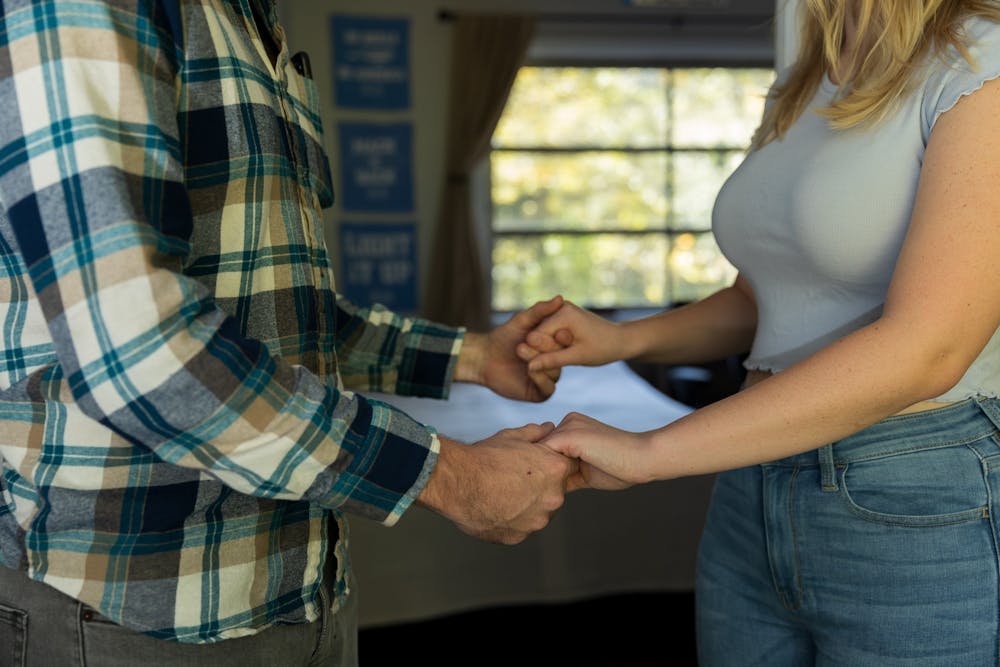Persia and Fitzgerald agreed that open communication and emotional vulnerability were the most important tools for living together during quarantine.
“I'm a total introvert, so at first, it was kind of difficult to have to share a space with someone constantly,” Fitzgerald said.
However, he said he appreciates being able to confide in someone who relates to his struggles, from school to pandemic anxiety.
“It's a really, really stressful time, and I think without Jen, I'd just be a mess,” he said.
Junior Ashlen Wright has also struggled to find her own space during quarantine. She moved in with her boyfriend, UNC alumnus Josh Starr, in January.
“It's so much easier to get, like, frustrated over a little thing or to just get on each other's nerves, no matter how much you care about each other,” Wright said.
Wright and Starr adapted to working and studying at home by setting boundaries. Shortly before the fall semester began, they moved into a larger apartment to give each other more space.
“We have a room that's just an office for studying,” Wright said. “If either of us need alone time, we'll just close the door and go in there for a while.”
Like Fitzgerald, Wright treasures her partner’s company despite the challenges of pandemic life.
“It's nice because you always have company,” she said. “You always have someone there to rely on.”
Keeping things fresh
Weber said the monotony of life in a pandemic can cause couples to struggle.
To get the day's news and headlines in your inbox each morning, sign up for our email newsletters.
"They're used to going out and doing things, and that's a little spice and variety that keeps things interesting,” she said.
Weber said the silver lining is that couples can appreciate the smaller, more domestic joys that they may have previously taken for granted.
“Some preliminary research findings seem to suggest that some couples are actually communicating better because of the pandemic,” Weber said. "And they're able just to focus on connecting in smaller ways, even though they can't go out and do elaborate dates.”
Persia and Fitzgerald spend most of their time in Zoom classes or working on assignments, but they always try to find a quiet moment to cook together or hang out with each other’s families.
“I feel like we're getting to know each other's inside world,” Persia said.
Another way the couple is keeping things fresh is taking note of all the quirks that went unseen during the long-distance period of their relationship.
Fitzgerald had always thought of his girlfriend as perpetually energetic and bubbly, and was amused to discover that Persia isn’t exactly a morning person.
“She takes, like, 45 minutes to get out of bed,” he said, laughing. “I was so surprised.”
Meanwhile, Wright and Starr have been getting to know their new dog, Dixie. Wright says taking care of Dixie helps the time fly, but she and Starr have also been spending their free time cooking, playing video games and sharing each other’s hobbies.
Wright maintains that it’s important for a couple not to do everything together. She said it's harder to feel independent when she spends so much time at home.
“I feel like I need to actively work on that — find my own hobbies and go see my own friends, and just be my own person,” she said.
Planning for the future
Persia and Fitzgerald are already making plans for a post-pandemic future together.
“We always talk about traveling together,” Persia said.
They hope to visit places that are important to each other, like Israel, where Persia spent a gap year before college, and Ireland, where Fitzgerald’s heritage lies.
While they have no way of knowing when that will be possible, Persia and Fitzgerald are confident about one thing: their relationship is not ending anytime soon.
“Going through something like this with someone I think brings you closer than just even spending time with them normally ever could,” Fitzgerald said.
Wright said quarantine has shown her and Starr’s compatibility.
“I know him so much better now than I did before,” she said. “He knows me so much better.”
Weber said crises like the pandemic have the potential to either break down or strengthen a relationship.
“When there's a big stressor, even if it's not about sickness, people tend to think about their values and their priorities,” she said.
Weber said distractions and superficial conflicts can fall away in times of crisis.
“I think sometimes that fear can make people think, well, what's important to me, like if I got sick with this tomorrow, what would I appreciate about my life?”
@chloesjoseph
arts@dailytarheel.com




